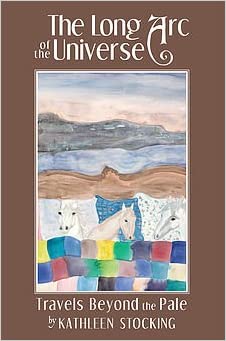Review — THE LONG ARC OF THE UNIVERSE by Kathleen Stocking (Thailand, Romania)
 The Long Arc of the Universe: Travels Beyond the Pale
The Long Arc of the Universe: Travels Beyond the Pale
by Kathleen Stocking (Thailand 2006-07; Romania 2010-12)
Stocking Press
384 pages’
January 2016
$19.95 (Paperback)
Reviewed by Kathleen Coskran (Ethiopia 1965-67)
•
The Long Arc of the Universe: Travels Beyond the Pale is an ambitious title with reverberations from Theodore Parker and Dr. Martin Luther King, Jr. coupled with the expectation of going where you aren’t necessarily comfortable. It is also a big book for a collection of essays, 384 pages, 5 sections: California, Latin America, Asia, Europe, and Home. These are not exactly parallel divisions: a state, three continents, and then Stocking’s home, the tiny village of Lake Leelanau, a knuckle on the skinny finger of land, Leelanau Peninsula, that juts into the northeastern waters of Lake Michigan. But it works. It works extremely well.
For some reason I started at the end, which I never do, and read the last essay first, “My Country,” the final entry in “Home.” Stocking writes, “My government is not my country. A government . . . is a huge, unwieldy bureaucracy with different policies at different times, depending on who gets in and who’s shoved out . . .. My country is the American people . . . I love my country.” There is much more to the essay than that, but her words resonated deeply in these tumultuous times. Then she went a step farther and ended the book, with permission, with Naomi Shihab Nye’s poem, “Kindness.” ” . . . it is only kindness that makes sense anymore….” Yes. She had me then. I knew I would love the book and I did. I read every essay with Stocking’s and Nye’s words echoing in my head, for I too love my country, believe it is only kindness that makes sense anymore, and savor being under the spell of a gifted writer which Stocking certainly is.
So that’s where this book that spans the long arc of the universe ends, at home, with kindness.
It begins in prison, specifically the state prison at Soledad, California, where Stocking is teaching writing in 1999. Her prison essays are honest, revelatory, and inspiring because she so deeply respected her students in spite of the caustic culture of disrespect that permeated the prison. One student told her he and the others thought she was a genius because, I believe, she respected them and challenged them. Near the end of her time there the men told her she was the scariest person they had ever known. “‘You just don’t quit,’ one said. ‘We think you’re fading and then you’re up, and you’re coming from a different direction, and we didn’t see you coming because you’d changed . . .. That’s what scary. You just don’t quit.'”
I was to learn that’s characteristic of Stocking: she just doesn’t quit. She perseveres in El Salvador teaching in unsettling, sometimes harrowing, circumstances; she rises to the challenge in Romania when she is assigned 500 students with no teaching materials; she makes do in Thailand with a co-teacher who seldom teaches. But she perseveres, always curious, always interested, always scary in the way the inmates at Soledad observed. She is interested; she is determined; she goes beyond what anybody expects including learning Tz’uiujxl in Guatemala. She just doesn’t quit.
Stocking is in her mid-60s when she joins the Peace Corps — twice — Thailand in 2007-09 and Romania 2011-13, both difficult postings, surprisingly difficult. I found her experience of being a volunteer a bit disconcerting and not reflective of my experiences in Ethiopia and Kenya in the late 1960s and early 70s. She quotes her niece, a well-traveled Canadian who works in a Thai refugee camp, who says she’d “seen Peace Corps volunteers all over the world, not doing much more than hanging out in the bars.” That said, Stocking clearly does work hard, is not hanging out in bars, but she does leave an unsettling view of the Peace Corps in the 21st century.
For me, the pull of the book, the reason to read it, is that she is a fearless traveler, an engaging writer who does her research and is curious about everything and everybody. She reminds me of the Canadian writer, Richard Wagenius who wrote that when he was a child, he “wanted to go to see.” His adoptive parents mistook that oft-expressed desire thinking he wanted to go to sea, but that wasn’t it at all. It was the unknown that pulled at him; he wanted to know, to see what was beyond the pale. Stocking too is propelled by a desire to see, to know what the world is like on the other side of the planet, or the country, or the great lake. For her the long arc of the universe is physical, crossing borders and staying long enough to experience daily life there, beyond the pale.
That said, the village of Lake Leelanau in northern Michigan is clearly her touchstone. She often returns to the small community that formed her, then leaves again, a woman alone, out to see. Kathleen Stocking is ready and able to go anywhere, and I was delighted to go with her.
•
Kathleen Coskran (Ethiopia 1965-67) is primarily a fiction writer but is currently working on a book about the lack of justice in the multiple criminal justice systems in the United States, based on her 25-year friendship with James Colvin, who has been incarcerated for nearly 50 years.
Thanks for your terrific energized review, Kathy. Marcia and I look forward
to reading some of your books, and soon your book about the criminal
justice system. Steve Crabtree (Axum 1965-67)